
LCGC EUROPE
Scope & Guideline
Connecting researchers to the pulse of chromatographic advancements.
Introduction
Aims and Scopes
- Advancements in Chromatography Techniques:
The journal emphasizes innovative methodologies in liquid chromatography, including developments in high-performance liquid chromatography (HPLC), supercritical fluid chromatography (SFC), and gas chromatography (GC). - Analytical Applications:
Studies presented often highlight practical applications of chromatography in diverse fields such as pharmaceuticals, environmental analysis, and food safety, showcasing its critical role in quality control and regulatory compliance. - Method Development and Optimization:
A consistent focus is placed on method development, optimization, and troubleshooting in chromatography, providing researchers and practitioners with insights into improving analytical performance. - Emerging Technologies and Trends:
The journal explores the integration of new technologies such as machine learning and advanced data processing in chromatography, reflecting the evolving landscape of analytical chemistry. - Environmental and Health Impact Studies:
Research often addresses the analysis of contaminants and toxins, emphasizing the importance of chromatography in environmental monitoring and public health.
Trending and Emerging
- Integration of Machine Learning and Chemometrics:
A growing trend is the application of machine learning and chemometric techniques to enhance method development and data analysis in chromatography, signaling a shift towards more data-driven approaches. - Focus on Biopharmaceutical Analysis:
There is an increasing emphasis on the analysis of biopharmaceuticals, including monoclonal antibodies and oligonucleotides, as the industry expands, necessitating advanced chromatographic techniques for characterization and quality control. - Environmental and Food Safety Applications:
Recent publications reflect a heightened focus on environmental monitoring and food safety, particularly in the analysis of contaminants and residues, underscoring the role of chromatography in addressing public health concerns. - Innovative Sample Preparation Techniques:
Emerging methodologies in sample preparation, such as new extraction techniques and automation, are gaining traction, highlighting the importance of sample integrity in analytical results. - Sustainability and Green Chemistry:
There is a noticeable trend towards incorporating sustainability principles and green chemistry practices in chromatographic methods, responding to global calls for environmentally friendly analytical techniques.
Declining or Waning
- Traditional Gas Chromatography Techniques:
Although still relevant, traditional gas chromatography methods have seen less focus as newer techniques and hybrid methodologies gain popularity, reflecting a shift towards more advanced analytical approaches. - Basic Troubleshooting Techniques:
Over time, there has been a noticeable decrease in articles dedicated to basic troubleshooting techniques, as the audience may be seeking more advanced and specialized content related to chromatography. - General Reviews on Chromatography Principles:
While foundational knowledge remains essential, there has been a waning interest in general review articles on chromatography principles, as the journal shifts towards more application-focused and innovative research.
Similar Journals

JPC-JOURNAL OF PLANAR CHROMATOGRAPHY-MODERN TLC
Exploring Modern TLC for Tomorrow's Discoveries.JPC-JOURNAL OF PLANAR CHROMATOGRAPHY-MODERN TLC, published by Springer Heidelberg, is a pivotal resource in the fields of Analytical Chemistry, Biochemistry, and Clinical Biochemistry. With an ISSN of 0933-4173 and an E-ISSN of 1789-0993, this journal serves as an essential platform for the dissemination of innovative research on planar chromatography techniques, specifically modern thin-layer chromatography (TLC). With its upcoming coverage extending to 2024 and a third quartile ranking (Q3) across major scientific categories in 2023, it addresses the critical advancements and applications in analytical methods. Although it does not offer open access, the journal's rigorous peer-review process ensures high-quality findings that contribute to the progression of these vital scientific disciplines. The journal is located in Heidelberg, Germany, and continues to be a beacon for researchers, professionals, and students who seek to enhance their knowledge and practice in chromatographic techniques.
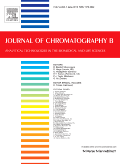
JOURNAL OF CHROMATOGRAPHY B-ANALYTICAL TECHNOLOGIES IN THE BIOMEDICAL AND LIFE SCIENCES
Innovating Chromatographic Techniques for Life SciencesJOURNAL OF CHROMATOGRAPHY B-ANALYTICAL TECHNOLOGIES IN THE BIOMEDICAL AND LIFE SCIENCES, published by Elsevier, stands as a critical resource in the fields of analytical chemistry, biochemistry, and life sciences. With an impressive convergence of research spanning from 2002 to 2024, this journal delivers high-quality, peer-reviewed articles that advance the methodologies and practices related to chromatographic techniques and their applications in biomedical research. The journal enjoys a reputable standing in the academic community, reflected in its 2023 Scopus rankings—ranked in the 65th and 55th percentiles in Analytical Chemistry and Clinical Biochemistry, respectively. Although it does not offer open access, it provides a vital platform for exchanging innovative ideas and findings, guiding professionals and scholars in addressing the complexities of contemporary biomedical challenges. The journal’s focus on interdisciplinary research positions it as an essential tool for researchers, professionals, and students eager to enhance their knowledge and contribute to advancements in this dynamic field.
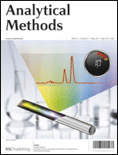
Analytical Methods
Elevating Standards in Analytical MethodologiesAnalytical Methods, published by the renowned Royal Society of Chemistry, is a distinguished journal that has been serving the scientific community since its inception in 2009. Specializing in the fields of Analytical Chemistry, Chemical Engineering, and General Engineering, this journal holds a reputable position with an impressive Q2 ranking in three relevant categories as of 2023. With its focus on innovative methodologies and advanced applications in analytical science, it aims to disseminate cutting-edge research and foster dialogue among researchers, professionals, and students. Although it is not an open access publication, it is accessible worldwide and provides critical insights into the latest developments in analytical techniques and their engineering applications. The journal also ranks highly in pertinent Scopus categories, such as being in the 77th percentile for General Engineering and 61st percentile for Analytical Chemistry, underlining its significance in advancing knowledge and practical applications in these fields. By participating in this journal, readers can expect to engage with high-quality research that influences the future of analytical practices and chemical engineering.

Chinese Journal of Chromatography
Exploring the Frontiers of Chromatography ResearchChinese Journal of Chromatography, published by SCIENCE PRESS, is a dedicated platform for disseminating pioneering research in the fields of Analytical Chemistry, Biochemistry, and Organic Chemistry. Established in 1997, this esteemed journal offers invaluable insights into chromatographic techniques and their applications, showcasing studies that contribute to the advancement of chemical engineering and electrochemistry. Although it currently holds a Q4 ranking in several categories, the journal aims to foster growth and knowledge among researchers, professionals, and students alike. With a continuous publication window extending until 2024, the Chinese Journal of Chromatography invites submissions that not only enhance scientific understanding but also address real-world challenges through innovative chromatographic solutions. Researchers looking for a collaborative community will find this journal a vital resource in their ongoing academic endeavors.
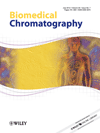
BIOMEDICAL CHROMATOGRAPHY
Catalyzing Insights in Biochemistry and PharmacologyBiomedical Chromatography is a prestigious journal published by Wiley, focusing on the vital intersections of analytical chemistry, biochemistry, and clinical studies. With an ISSN of 0269-3879 and E-ISSN of 1099-0801, it has served the research community since its inception in 1986. The journal provides a platform for innovative research in areas such as drug discovery and pharmacology, achieving a commendable placement in Q3 across multiple categories in the 2023 metrics, including Analytical Chemistry and Biochemistry. Although it currently does not offer open access, it plays a crucial role in disseminating scientific developments and methodologies that contribute to advancements in health, safety, and pharmaceuticals. Researchers, professionals, and students can anticipate high-quality, peer-reviewed articles that drive forward the collective knowledge in biomedical applications. Located in the United Kingdom at 111 River St, Hoboken, NJ, the journal continues to attract contributions from global thought leaders in the field.

CHROMATOGRAPHIA
Illuminating the Path of Chemical InnovationCHROMATOGRAPHIA is a renowned scholarly journal published by Springer Heidelberg, specializing in the field of analytical chemistry, biochemistry, and organic chemistry since its inception in 1968. With its ISSN 0009-5893 and E-ISSN 1612-1112, the journal has maintained a robust profile, currently ranking in the Q3 and Q4 quartiles within significant Chemistry categories. Aimed at researchers, professionals, and students, CHROMATOGRAPHIA serves as a critical platform for disseminating innovative research, methodologies, and advancements related to chromatography and its applications in various scientific fields. While the journal is not open access, it offers significant visibility and scholarly contribution opportunities, making it an essential resource for those engaged in the vibrant intersection of chemistry and biochemistry.
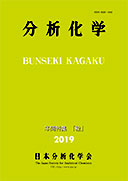
BUNSEKI KAGAKU
Connecting Researchers Through Quality ScholarshipBUNSEKI KAGAKU, published by the Japan Society Analytical Chemistry, is a reputable journal dedicated to the field of analytical chemistry. With an ISSN of 0525-1931, this journal has been a crucial outlet for scholarly communication since its inception in 1952, converging its publication years from 1954 to 1957 and from 1959 to 2024. Although it holds a Q4 category ranking in the most recent 2023 quartiles of analytical chemistry and ranks 153/156 in Scopus, it continues to serve as a platform for quality research, fostering advancements in the field. BUNSEKI KAGAKU is based in Tokyo, Japan, and emphasizes the critical importance of analytical techniques in scientific inquiry. With a commitment to professionalism and rigor, the journal provides a vital resource for researchers, students, and professionals seeking to explore innovative methodologies and contribute to the ongoing dialogue in analytical chemistry.

BMC Chemistry
Empowering Discoveries in the World of ChemistryBMC Chemistry, published by BMC, is a reputable open access journal that has made significant strides since its inception in 2019. Operating under e-ISSN 2661-801X, this journal is dedicated to advancing the field of general chemistry by promoting high-quality research across various sub-disciplines. Headquartered in the United Kingdom, BMC Chemistry boasts a commendable impact factor and is classified in Q2 within the prestigious field of Chemistry (miscellaneous) according to the 2023 category quartiles. The journal's Scopus ranking places it at #139 out of 408 in its category, highlighting its growing relevance and influence in the academic community, with a commendable 66th percentile standing. With a commitment to open access, BMC Chemistry ensures that groundbreaking discoveries and innovative research are available to a global audience, fostering collaboration and development in chemistry. Researchers, professionals, and students alike will find this journal to be an invaluable resource for disseminating knowledge and driving scientific advancement.
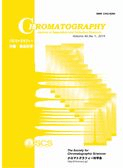
Chromatography
Unveiling breakthroughs in chromatography for a sustainable future.Chromatography is an esteemed journal published by the SOC CHROMATOGRAPHIC SCIENCES, dedicated to advancing the field of chromatographic techniques and their applications across various disciplines, including analytical chemistry, biochemistry, and environmental science. By facilitating the exchange of high-quality research, Chromatography plays a pivotal role in enhancing methodologies and technologies that drive innovation in sample analysis. While the journal is not currently open access, it maintains a rigorous peer-review process, ensuring the publication of valuable and impactful studies. Researchers, professionals, and students alike can benefit from its comprehensive coverage of chromatography-related advancements, making it a vital resource for anyone engaged in this dynamic area of study.
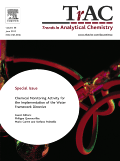
TRAC-TRENDS IN ANALYTICAL CHEMISTRY
Connecting Researchers for a Brighter Analytical FutureTRAC - Trends in Analytical Chemistry is a prestigious journal published by Elsevier Science Ltd, situated in the Netherlands. With an impressive impact factor reflected in its Q1 rankings across three major categories—Analytical Chemistry, Environmental Chemistry, and Spectroscopy—this journal stands at the forefront of disseminating pioneering research and advancements in the field of analytical chemistry. Established in 1981, TRAC provides a comprehensive platform for researchers to share influential studies and insights related to the latest trends, methodologies, and technologies in analytical techniques. Recognized globally, the journal excels in fostering cross-disciplinary dialogue and innovation, making it an indispensable resource for academics, professionals, and students alike. Explore the latest issues to stay abreast of cutting-edge developments that shape the analytical sciences.